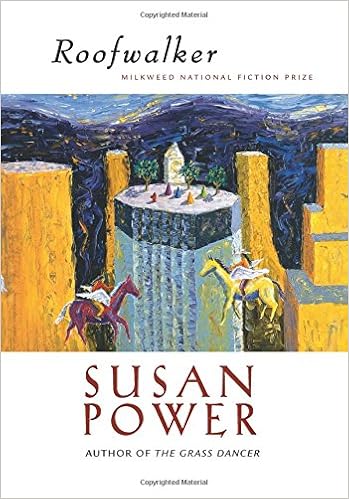Whereas and Roofwalker, reviews
Whereas, poems by Layli Long
Soldier
Graywolf Press, 2017
Roofwalker, Susan Power
Milkweed Editions, 2004
Ever since I read Unsettling Truths: The Ongoing, Dehumanizing
Legacy of the Doctrine of Discovery by Mark Charles and Soong-Chan Rah, I’ve
read a couple other books by Native Americans. I loved Roofwalker, Milkweed Editions, 2002, by Susan Power (enrolled
member of the Standing Rock Tribe) mostly because I’ve lived in the Uptown
neighborhood since 1982, since it was a wreck. I was familiar with the Native Americans
dislocated to Uptown. It wasn’t by accident that Native Americans came to
Uptown. 1) There was again one of those misguided federal programs (Urban Indian
Relocation Program) directed at Native Americans living on reservations, to
help them get off their land and assimilated into mainstream society. There was
an incentive to come down to Chicago—and back then there was manufacturing work.
2) Native Americans ended up in Uptown because in 1953 the American Indian
Center was established there. And, 3) there was day labor organizations that
worked in cahoots with the bars n Wilson Avenue that would cash their checks.
It wasn’t really pie in the sky.
Between 1950 and 1970, Chicago's
American Indian population grew from 775 to 6,575, according to census records.
The largest concentration was in Uptown.
Lately that number has gone way down
with the rapid increase of gentrification and loss of low-income housing.
Additionally the American Indian Center moved to the near suburbs. From the Chicago Reporter: “In the earliest days
of the center's life, 70 percent of our Native population was in walking
distance of the center and that is no longer true," said the Rev. Peter
Powell, a retired Episcopal priest and American Indian Center founding member
who has deep ties to Chicago's Native American community, having been adopted
by the Cheyenne nation of Montana.
A longtime presence at the American
Indian Center and the man behind the now-closed St. Augustine's Center for
American Indians — one of more than a dozen sister agencies that assisted
Native Americans in the city — Powell, 88, said Uptown was a perfect fit for
migrating Native American families in the 1960s.”
Housing in Uptown was nothing
grand, but it was affordable. Jobs were not great, but there was work. There
was a sizable population that some didn’t always feel homesick. I met many
extended families of Native Americans living in Uptown. Nearly all of them were
living with trauma, either hereditary or recent. Roofwalker does a good job of representing the Native American
experience by taking us inside many different family situations. I particularly
remember the story of the lady running the junk store. I remember when coming
to Uptown that there were several Mom & Pop junk stores on Wilson Ave. that
sprung up and disappeared as the junk ebbed and flowed.
Whereas, poems by Layli Long Soldier. She is an enrolled member of
the Oglala Sioux Tribe. Her book is a mediation on language and specifically
upon the apology offered by President Obama (U.S.
Apology To Native Americans) in 2009. It was an “apology” that sowed more
discontent than resolution and re-opened past wounds. I won’t go into
specifics. Buy Unsettling Truths: The
Ongoing, Dehumanizing Legacy of the Doctrine of Discovery by Mark Charles
and Soong-Chan Rah for a more in-depth look from a Native perspective.
In whereas Long Soldier meditates on the language and wording of the
Apology, making it personal ie how does it apply to her, her family, her work,
her art. We already know it fell woefully short to rectify or bring reconciliation
to past injustices (maybe not so far in the past—see Standing Rock and Keystone
pipeline. This story is ongoing.), but Long Soldier sets up many “poems” that
examines it.
“I’m transformed by language. I am
often
Couched in footnote or blazing in
title.
Where in the body do I begin;”
Whereas she looks at the apology
from moments in her own life.
“WHEREAS at four years old I read
the first chapter of the Bible aloud I was not Christian
Whereas my hair unbraided ran the
length of my spine I sometimes sat on it
Whereas at the table my legs
dangled I could not balance peas on my fork
Whereas I used my fingers
carefully I pushed the bright green onto silver tines
Whereas you can eat like a pig the
lady said setting my plate on the floor
Whereas she instructed me to
finish on my hands and knees she took another bite . . . “
Long Soldier brings us into that
corner, into the silent grassesgrassesgrasses wavering around her. Through her
words we are able to understand what it feels like to be invisible—yet awake to
what is inside. All those words floating around our mind.


Comments